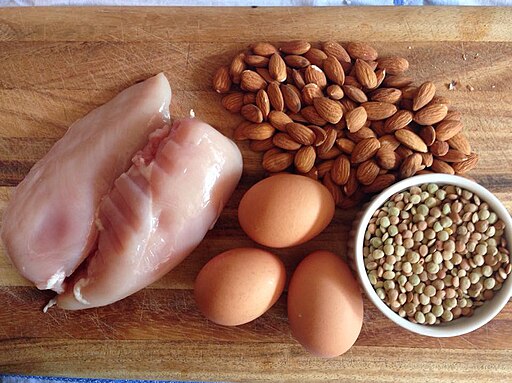protein main sources and benefits.
✅ Top Benefits of Protein
1. Builds and Repairs Muscle
- Essential for muscle growth, repair, and recovery — especially after exercise or injury.
2. Supports Weight Loss and Management
- Increases feelings of fullness, reducing hunger and calorie intake.
- Helps preserve lean muscle mass during weight loss.
3. Boosts Metabolism
- Protein has a higher thermic effect (your body burns more calories digesting it compared to carbs or fat).
4. Strengthens Bones
- Protein-rich diets are linked to better bone density and reduced risk of osteoporosis, especially in older adults.
5. Supports Immune Function
- Helps form antibodies and other immune system components.
6. Maintains Skin, Hair, and Nails
- Structural proteins like collagen and keratin are essential for healthy appearance.
7. Hormone Production
- Protein is needed to produce important hormones like insulin, growth hormone, and others.
8. Aids in Enzyme Function
- Enzymes (which drive nearly all chemical reactions in your body) are made of protein.
9. Stabilizes Blood Sugar
- Protein slows down the absorption of sugar, helping prevent blood sugar spikes.
💡 How Much Do You Need?
- General adult: ~0.8g per kg of body weight
- Active people: 1.2–2.2g/kg
- Older adults: May need more to prevent muscle loss
Here’s a list of high-protein foods, categorized for easy reference:
🥩 Animal-Based Protein Sources
These are complete proteins (contain all essential amino acids):
- Meat:
- Chicken breast
- Turkey
- Lean beef
- Pork loin
- Lamb
- Seafood:
- Salmon
- Tuna
- Shrimp
- Cod
- Sardines
- Dairy:
- Greek yogurt
- Cottage cheese
- Milk
- Cheese (e.g., cheddar, mozzarella)
- Eggs:
- Whole eggs
- Egg whites (pure protein)
🌱 Plant-Based Protein Sources
Some are incomplete proteins (lacking some essential amino acids), but combining them can cover all needs:
- Legumes:
- Lentils
- Chickpeas
- Black beans
- Kidney beans
- Peas
- Grains:
- Quinoa (complete protein)
- Brown rice
- Oats
- Whole wheat
- Soy Products (complete proteins):
- Tofu
- Tempeh
- Edamame
- Soy milk
- Nuts & Seeds:
- Almonds
- Peanuts
- Chia seeds
- Flaxseeds
- Pumpkin seeds
- Sunflower seeds
- Other:
- Seitan (wheat gluten, high in protein)
- Nutritional yeast
🔥 Trending Protein FAQs (2025)
1. How much protein do I really need per day?
- It depends on your age, weight, activity level, and goals.
- Sedentary adult: 0.8g/kg
- Active: 1.2–2.2g/kg
- For muscle gain: Up to 2.2g/kg may be beneficial.
2. Is it okay to eat too much protein?
- For healthy individuals, higher protein intake is generally safe.
- People with kidney disease should consult a doctor.
3. Can protein help me lose weight?
- Yes. Protein keeps you full longer, reduces appetite, and preserves muscle mass during calorie cuts.
4. What are the best plant-based protein sources?
- Tofu, tempeh, lentils, quinoa, chickpeas, beans, and edamame are great options.
5. When should I eat protein — before or after a workout?
- After a workout is ideal for muscle recovery.
- Having some before can also help reduce muscle breakdown.
6. Is whey protein safe?
- Yes, whey protein is safe for most people and is one of the most effective supplements for muscle growth.
7. Can I build muscle without protein shakes?
- Absolutely. Shakes are just convenient, but you can get all the protein you need from whole foods.
8. What’s the difference between whey and plant protein?
- Whey is faster-absorbing and has a complete amino acid profile.
- Plant proteins can be just as effective, especially if combined properly (e.g., rice + pea).
9. Does protein cause acne or hair loss?
- No strong evidence links protein to acne or hair loss, though some whey products may affect people sensitive to dairy.
10. Is protein only important for athletes?
- No. Everyone needs protein for tissue repair, immune function, and overall health, not just athletes.
11. What are the 7 main proteins?
- There is a total of seven different protein types under which all proteins fall. These include antibodies, contractile proteins, enzymes, hormonal proteins, structural proteins, storage proteins, and transport proteins.
12. What is the definition of a protein?
- (PROH-teen) A molecule made up of amino acids. Proteins are needed for the body to function properly. They are the basis of body structures, such as skin and hair, and of other substances such as enzymes, cytokines, and antibodies.
13. Which food is highest in protein?
- The food with the highest protein content varies based on the serving size and how it’s prepared, but generally, lean meats, poultry, and seafood are excellent sources, with some plant-based options like tofu, lentils, and nuts also being very high in protein.

Leave a Reply Cancel reply